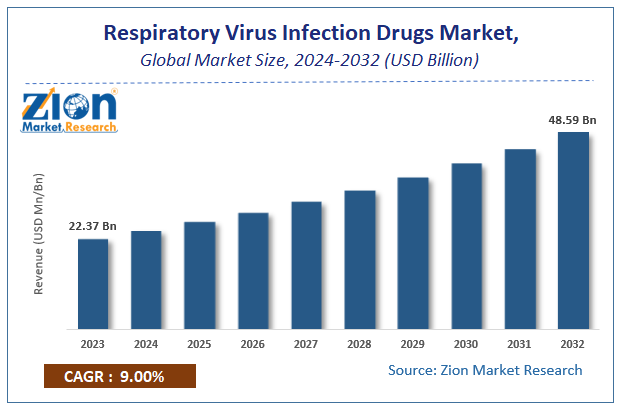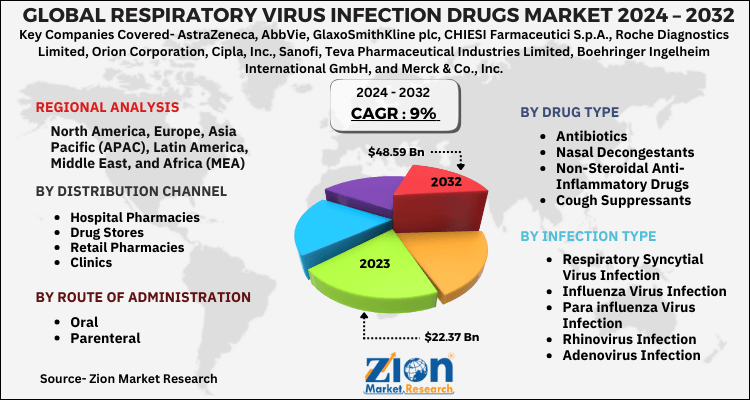Respiratory Virus Infection Drugs Market Size, Share and Forecast 2032

Respiratory Virus Infection Drugs Market By Drug Type (Antibiotics, Nasal Decongestants, Non-Steroidal Anti-Inflammatory Drugs, and Cough Suppressants), By Infection Type (Respiratory Syncytial Virus Infection, Adenovirus Infection, Influenza Virus Infection, Para influenza Virus Infection, and Rhinovirus Infection), By Distribution Channel(Hospital Pharmacies, Clinics, Retail Pharmacies, and Drug Stores ), By Route of Administration (Oral and Parenteral), And By Region- Global Industry Perspective, Comprehensive Analysis, and Forecast, 2024-2032
| Market Size in 2023 | Market Forecast in 2032 | CAGR (in %) | Base Year |
|---|---|---|---|
| USD 22.37 Billion | USD 48.59 Billion | 9% | 2023 |
Respiratory Virus Infection Drugs Market Insights
According to Zion Market Research, the global Respiratory Virus Infection Drugs Market was worth USD 22.37 Billion in 2023. The market is forecast to reach USD 48.59 Billion by 2032, growing at a compound annual growth rate (CAGR) of 9% during the forecast period 2024-2032. The report offers a comprehensive analysis of the market, highlighting the factors that will determine growth, potential challenges, and opportunities that could emerge in the Respiratory Virus Infection Drugs Market industry over the next decade.
Respiratory Virus Infection Drugs Market: Overview
Respiratory viruses such as influenza, coronavirus, Para influenza, rhinovirus, respiratory syncytial virus, and human metapneumovirus are the most common causes of respiratory virus infections in immuno-compromised persons. Moreover, early diagnosis & treatment of these infections through drugs can prove to be effective & beneficial for immuno-compromised patients affected due to respiratory virus infections since viral replication & invasive infection can prove to be fatal. In the past few years newly emerging viral respiratory pathogens such as avian influenza, pandemic influenza, SARS-CoV, and MERS-CoV have been constantly posing challenges to private as well as public healthcare systems.
Hence, there is a growing necessity for developing cost-efficient anti-viral agents & drugs. Recently, antiviral drugs are being developed by virologists & pharmaceutical firms for targeting viral entry, virus replication, and virus release for inhibiting proliferation & blocking the growth & spread of viruses in the human body.
According to NIH researchers, Amantadine and Rimantadine medicines/pharmacokinetics are used for inhibiting replication of the influenza A virus by interfering with viral M2 protein activity. Moreover, both Amantadine and Rimantadine have proved to be effective in low proportions against influenza B virus. Reportedly, both these drugs are administered in oral form as tablets or in syrup form at 5mg per kg of body mass for children.
They are administered nearly up to 200 mg per day for adults. As per clinical trials, both Amantadine and Rimantadine have proved effective in preventing influenza in over 60% of subjects. For the record Zanamivir and Oseltamivir available for oral administration in powdered, capsule, and liquid form have also helped in preventing influenza infections in over 65% of subjects.
Respiratory Virus Infection Drugs Market: Growth Drivers
The massive use of artificial intelligence and machine learning in drug discovery is projected to favorably influence the growth of the respiratory virus infection drugs market. Humungous use of combination therapy is projected to boost the rate of success of treating respiratory virus infection through anti-viral drugs. This, in turn, will facilitate the elevation of the respiratory virus infection drug market size in upcoming years. Apart from this, effective drug delivery through nanotechnology is projected to provide new growth prospects for the respiratory virus infection drugs market in near future. In addition to this, a rise in healthcare spending & surge in vaccination activities will spur the respiratory virus infection drugs industry growth.
With an AI-based multi-program model enabling the production of antibiotic resistance drug molecules for various kinds of harmful viruses, the market for respiratory virus infection drugs is anticipated to gain traction in the years ahead. Giant pharma firms are trying to enter into partnerships with other local or regional pharma firms for developing new drugs for treating respiratory virus infections in children, thereby helping the respiratory virus infection drugs market explore new areas of growth in the ensuing years. Nonetheless, easy access to generic drug substitutes can pose a threat to the growth of the respiratory virus infection drugs market in near future.
Respiratory Virus Infection Drugs Market: Report Scope
| Report Attributes | Report Details |
|---|---|
| Report Name | Respiratory Virus Infection Drugs Market |
| Market Size in 2023 | USD 22.37 Billion |
| Market Forecast in 2032 | USD 48.59 Billion |
| Growth Rate | CAGR of 9% |
| Number of Pages | 140 |
| Key Companies Covered | AstraZeneca, AbbVie, GlaxoSmithKline plc, CHIESI Farmaceutici S.p.A., Roche Diagnostics Limited, Orion Corporation, Cipla, Inc., Sanofi, Teva Pharmaceutical Industries Limited, Boehringer Ingelheim International GmbH, and Merck & Co., Inc. |
| Segments Covered | By Drug Type, By Infection Type, By Distribution Channel, By Route of Administration, and By Region |
| Regions Covered | North America, Europe, Asia Pacific (APAC), Latin America, Middle East, and Africa (MEA) |
| Base Year | 2023 |
| Historical Year | 2018 to 2022 |
| Forecast Year | 2024 - 2032 |
| Customization Scope | Avail customized purchase options to meet your exact research needs. Request For Customization |
Respiratory Virus Infection Drugs Market: Regional Landscape
North American Market To Hit New Terrains of Growth By 2032
The expansion of the respiratory virus infection drugs market during 2023-2032 can be attributed to new drug approvals by regulatory authorities such as U.S. FDA. Apart from this, the presence of enhanced healthcare amenities along with early acceptance of advanced therapeutics in the healthcare sector in countries like Canada and the U.S. will help the respiratory virus infection drugs market in North America gain acceleration. Apart from this, growing healthcare awareness among the people and easy access to diagnostic tests in the sub-continent will further contribute towards the growth of the respiratory virus infection drugs market in North America during 2021-2028.
Respiratory Virus Infection Drugs Market: Competitive Landscape
Key players leveraging the industry landscape and profiled in the report include
- AstraZeneca
- AbbVie
- GlaxoSmithKline plc
- CHIESI Farmaceutici S.p.A.
- Roche Diagnostics Limited
- Orion Corporation
- Cipla, Inc
- Sanofi
- Teva Pharmaceutical Industries Limited
- Boehringer Ingelheim International GmbH
- Merck & Co., Inc
The global Respiratory Virus Infection Drugs Market is segmented as follows:
By Drug Type
- Antibiotics
- Nasal Decongestants
- Non-Steroidal Anti-Inflammatory Drugs
- Cough Suppressants
By Infection Type
- Respiratory Syncytial Virus Infection
- Influenza Virus Infection
- Para influenza Virus Infection
- Rhinovirus Infection
- Adenovirus Infection
By Distribution Channel
- Hospital Pharmacies
- Drug Stores
- Retail Pharmacies
- Clinics
By Route of Administration
- Oral
- Parenteral
By Region
- North America
- The U.S.
- Canada
- Europe
- France
- The UK
- Spain
- Germany
- Italy
- Rest of Europe
- Asia Pacific
- China
- Japan
- India
- South Korea
- Southeast Asia
- Rest of Asia Pacific
- Latin America
- Brazil
- Mexico
- Rest of Latin America
- Middle East & Africa
- GCC
- South Africa
- Rest of Middle East & Africa
Table Of Content
Methodology
FrequentlyAsked Questions
Which key factors will influence the Respiratory Virus Infection Drugs Market growth over 2024-2032?
Massive use of artificial intelligence and machine learning in drug discovery is projected to favorably influence growth of respiratory virus infection drugs market. Humungous use of combination therapy is projected to boost rate of success of treating respiratory virus infection through anti-viral drugs. This, in turn, will facilitate elevation of respiratory virus infection drugs market size in upcoming years. Apart from this, effective drug delivery through nanotechnology is projected to provide new growth prospects for respiratory virus infection drugs market in near future. In addition to this, rise in healthcare spending & surge in vaccination activities will spur respiratory virus infection drugs industry growth
According to Zion Market Research, the global Respiratory Virus Infection Drugs Market was worth USD 22.37 Billion in 2023. The market is forecast to reach USD 48.59 Billion by 2032, growing at a compound annual growth rate (CAGR) of 9% during the forecast period 2024-2032.
North America will contribute lucratively towards the global market value over the estimated timeline. The regional market surge is subject to new drug approvals by regulatory authorities such as U.S. FDA. Apart from this, presence of enhanced healthcare amenities along with early acceptance of advanced therapeutics in healthcare sector in countries like Canada and the U.S. will help respiratory virus infection drugs market in North America gain acceleration.
The key market participants include AstraZeneca, AbbVie, GlaxoSmithKline plc, CHIESI Farmaceutici S.p.A., Roche Diagnostics Limited, Orion Corporation, Cipla, Inc., Sanofi, Teva Pharmaceutical Industries Limited, Boehringer Ingelheim International GmbH, and Merck & Co., Inc.
HappyClients
Zion Market Research
Tel: +1 (302) 444-0166
USA/Canada Toll Free No.+1 (855) 465-4651
3rd Floor,
Mrunal Paradise, Opp Maharaja Hotel,
Pimple Gurav, Pune 411061,
Maharashtra, India
Phone No +91 7768 006 007, +91 7768 006 008
US OFFICE NO +1 (302) 444-0166
US/CAN TOLL FREE +1 (855) 465-4651
Email: sales@zionmarketresearch.com
We have secured system to process your transaction.
Our support available to help you 24 hours a day, five days a week.
Monday - Friday: 9AM - 6PM
Saturday - Sunday: Closed






